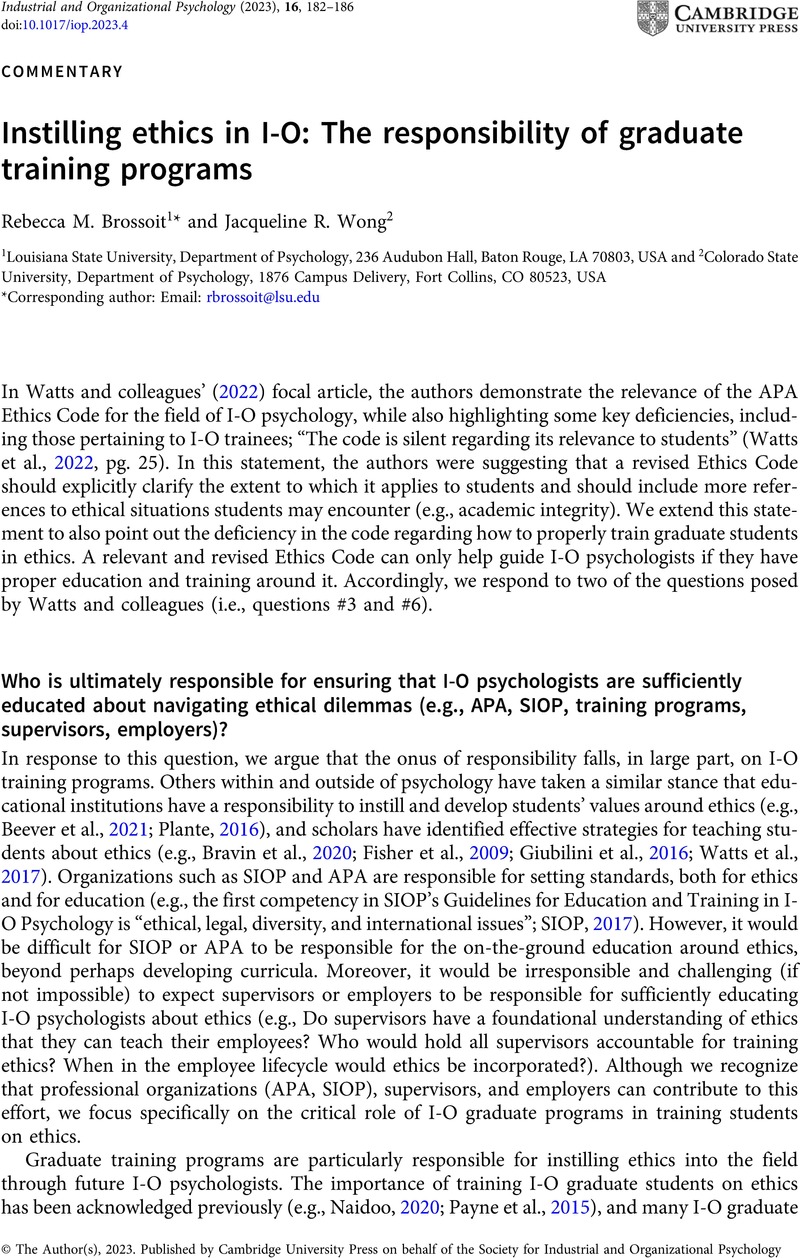No CrossRef data available.
Article contents
Instilling ethics in I-O: The responsibility of graduate training programs
Published online by Cambridge University Press: 09 May 2023
Abstract
An abstract is not available for this content so a preview has been provided. Please use the Get access link above for information on how to access this content.

- Type
- Commentaries
- Information
- Copyright
- © The Author(s), 2023. Published by Cambridge University Press on behalf of the Society for Industrial and Organizational Psychology
References
References
Beever, J., Kuebler, S. M., & Collins, J. (2021). Where ethics is taught: An institutional epidemiology. International Journal of Ethics Education, 6(2), 215–238.CrossRefGoogle Scholar
Bravin, J., Carrasco, J., & Kalichman, M. (2020). Ethical foundations for graduate students in the psychological sciences. Translational Issues in Psychological Science, 6(3), 247–256.CrossRefGoogle ScholarPubMed
Brossoit, R. M., Wong, J. R., Robles-Saenz, F., Barber, L. K., Allen, T. D., & Britt, T. W. (2021). Is that Ethical? The Current State of Industrial-Organizational Psychology Graduate Training in Ethics. The Industrial-Organizational Psychologist, 58(3).Google Scholar
Fisher, C. B., Fried, A. L., & Feldman, L. G. (2009). Graduate socialization in the responsible conduct of research: A national survey on the research ethics training experiences of psychology doctoral students. Ethics & Behavior, 19(6), 496–518.CrossRefGoogle ScholarPubMed
Giubilini, A., Milnes, S., & Savulescu, J. (2016). The medical ethics curriculum in medical schools: present and future. Journal of Clinical Ethics, 27(2), 129–145.CrossRefGoogle ScholarPubMed
Lefkowitz, J. (2008). To prosper, organizational psychology should… expand the values of organizational psychology to match the quality of its ethics. Journal of Organizational Behavior, 29(4), 439–453. https://doi.org/10.1002/job.527
CrossRefGoogle Scholar
Naidoo, L. J. (2020). Max. classroom capacity: How should we teach ethics in I-O psychology? The Industrial-Organizational Psychologist, 54(4). Retrieved from https://www.siop.org/Research-Publications/Items-of-Interest/ArticleID/3428/ArtMID/19366
Google Scholar
Payne, S. C., Morgan, W. B., & Allen, J. A. (2015). Revising SIOP’s guidelines for education and training graduate program director survey results. The Industrial-Organizational Psychologist, 53(2), 158–161.Google Scholar
Plante, T. G. (2016). How Universities can Foster Ethical Awareness Among Students. Psychologist Today. Retrieved from https://www.psychologytoday.com/us/blog/do-the-right-thing/201610/how-universities-can-foster-ethical-awareness-among-students
Google Scholar
Society for Industrial and Organizational Psychology, Inc (SIOP). (2017). Guidelines for education and training in industrial/organizational psychology. Bowling Green, OH: Author.Google Scholar
Watts, L. L., Lefkowitz, J., Gonzalez, M. F., & Nandi, S. (2022) How relevant is the APA ethics code to Industrial-Organizational Psychology? Applicability, deficiencies, and recommendations. Industrial and Organizational Psychology: Perspectives on Science and Practice, 16(2), 1–42.Google Scholar
Watts, L. L., Medeiros, K. E., Mulhearn, T. J., Steele, L. M., Connelly, S., & Mumford, M. D. (2017). Are ethics training programs improving? A meta-analytic review of past and present ethics instruction in the sciences. Ethics & Behavior, 27(5), 351–384.CrossRefGoogle ScholarPubMed
Resources
CAPE’s educator resources: https://www.siop.org/Career-Center/Professional-Ethics
Google Scholar
CAPE’s Dilemma Deck: https://www.siop.org/Career-Center/Professional-Ethics/Dilemma-Deck
Google Scholar
Determining authorship: Fine, M. A., & Kurdek, L. A. (1993). Reflections on determining authorship credit and authorship order on faculty-student collaborations. American Psychologist, 48(11), 1141–1147.CrossRefGoogle Scholar
Ethics-related case study examples:Google Scholar
Lefkowitz, J. (2021). Forms of ethical dilemmas in industrial-organizational psychology. Industrial and Organizational Psychology, 14(3), 297–319.CrossRefGoogle Scholar
Lowman, R. L. (2006). The ethical practice of psychology in organizations. American Psychological Association.Google Scholar
Open science framework: https://osf.io/
Google Scholar
Role of Mentors in Promoting an Ethics Culture: Bravin, J., Carrasco, J., & Kalichman, M. (2020). Ethical foundations for graduate students in the psychological sciences. Translational Issues in Psychological Science, 6(3), 247–256.CrossRefGoogle ScholarPubMed




